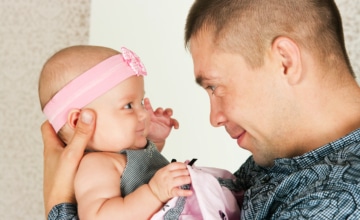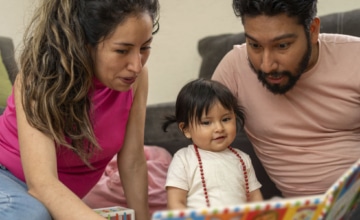This handout is based on findings from a report From Neurons to Neighborhoods: The Science of Early Childhood Development* from the National Academy of Sciences that examined child and brain development in the early years. The information we offer is age-specific, summarizes key findings from the report, and suggests how you might be able to use these key findings to nurture your own child’s healthy development.
Key Findings
Findings from the From Neurons to Neighborhoods: The Science of Early Childhood Development include:
- Your relationship with your child is the foundation of his or her healthy development.
- Your child’s development depends on both the traits he or she was born with (nature), and what he or she experiences (nurture).
- All areas of development (social, emotional, intellectual, language and motor) are linked. Each depends on, and influences, the others.
- What children experience, including how their parents respond to them, shapes their development as they adapt to the world.
How Development Looks in Everyday Life

This example shows how all areas of Benjamin’s development are linked and how his parents help to encourage his development.
Benjamin cries because he has come to expect that his parents will respond. When mom and dad don’t give up trying to comfort Benjamin no matter how frustrating it can be, they are nurturing his social and emotional development because it makes him feel important and he learns to trust that his parents will care for him. This gives him the confidence to trust others, which will help him form healthy relationships as he grows
Relationships are the foundation of a child’s healthy development.
In addition, being soothed by his parents in these early months will help him learn to soothe himself as he gets older, a very important skill throughout life. Using his voice and body to communicate is part of Benjamin’s early language and motor development. When his parents answer his cries, he learns that his efforts at communicating are successful, which encourages him to communicate more, first through gestures and sounds, and later through words.
Charting Your Child’s Healthy Development
The following chart describes many of the things your baby is learning between birth and 2 months and what you can do to support your child in all areas of her development. As you read, remember that children develop at their own pace and in their own way. Understanding who your child is, what her strengths are and where she needs more support, are essential for promoting her healthy development. If you have questions regarding your child’s development, ask your pediatrician.
| What’s going on: | What you can do: | Questions to ask yourself: |
|---|---|---|
| One of the most important tasks of the first 2 months is to help newborns feel comfortable in their new world. | Observe carefully. This will help you figure out what your baby’s cries are telling you. | What soothes your baby? How do you know? |
| Babies are learning to regulate their eating and sleeping patterns and their emotions, which help them feel content, safe and secure. | Soothe your baby. When you respond to your baby’s cries and meet his needs, you let him know he is loved. You can’t spoil a baby. In fact, by responding lovingly to his needs, you are helping him learn skills now that allow him eventually to soothe himself. You are also promoting a strong bond and healthy brain development. | What most distresses him? |
| Newborns use their gestures (body movements), sounds and facial expressions to communicate their feelings and needs from day 1. They use different cries to let you know they are hungry, tired or bored. | Figure out what your baby is trying to tell you. Responding makes him feel important and tells him he is a good communicator. This builds a positive sense of self and a desire to communicate more. | How does your baby communicate with you? |
| Babies ask for a break by looking away, arching their backs, frowning or crying. They socialize with you by watching your face and exchanging looks. | Talk and sing to your baby. Tell him about everything that’s going on around him. Pay attention to the sights and sounds he likes. Find toys and everyday objects with different colors and textures and see which he likes best. | What kinds of interactions does he like best? How do you know? How does he let you know when he has had enough? |
| Play helps babies learn about the world around them. It is also an important way they connect with you, helping them to develop a strong attachment and promoting healthy social development. | Play “tracking” games by moving yourself and interesting objects back and forth. First he will use his eyes to follow. Eventually he will move his head from side to side. This helps strengthen his neck muscles as well as exercise his visual abilities | What kind of toys grab your baby’s attention? How does he let you know what he’s interested in? What kind of play do you enjoy most with your baby? |
*About “From Neurons to Neighborhoods”
The report From Neurons to Neighborhoods: The Science of Early Childhood Development was a 22-year effort by a group of 17 leading professionals with backgrounds in neuroscience, psychology, child development, economics, education, pediatrics, psychiatry and public policy. They reviewed what was known about the nature of early child development and the influence of early experiences on children’s health and well-being. The study was sponsored by a number of federal agencies and private foundations.
Download the PDF to view the original handout.




